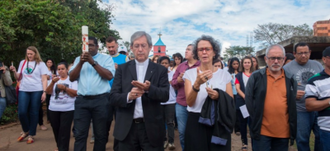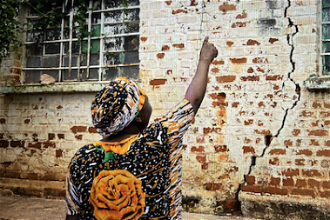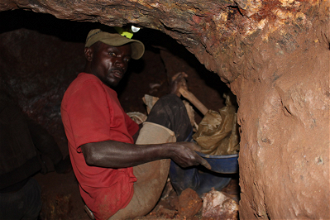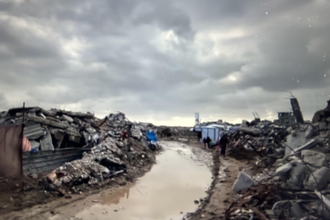Latin American Church groups demand post-extractivist economy

Churches and Mining Network march
Source: London Mining Network
More than 100 Catholic Religious Congregations and Conferences from seven countries sign a manifesto in which they demand a post-extractivist model of development which respects people and the environment.
In November, an in-person meeting of the Latin American Ecclesial Assembly was held, bringing together the Continental Conferences of the Latin American Catholic Church in a key synod. Concern for poor people and the environment, both victims of the current economic system, are among the challenges and focuses of the Assembly's proposals for pastoral change through conversion to an 'Integral Ecology'.
In a statement prior to the event, which took place in hybrid form with an in-person meeting in Mexico City, more than 300 church organisations and popular movements joined Pope Francis's call during the Fourth Meeting with Popular Movements: time to stop the locomotive that is taking us into the abyss. In a manifesto entitled "Instead of an economy of death, let's build a Samaritan economy", the organisations proposed taking "decisions that are consistent in their finance and consumption practices, in economic and investment policies, that promote human rights, social justice, climate and environmental justice, gender equality and the common good, in line with the divine mandate to protect God's creation (Genesis 2:15).
Among the organisations pushing the call for an economy "which acts as an instrument of the mission of the Church", were more than 100 religious congregations and the National Conferences of Religious congregations [Catholic religious communities] from Brazil, Argentina, Bolivia, Guatemala, El Salvador, Ecuador and the Dominican Republic. "We have made a prophetic commitment to help transform the economic model of inequality", states the document.
Launched earlier at the United Nations Conference on Climate Change (COP26), in collaboration with the Ecclesial Assembly for Latin America and the Caribbean and online with the Action Platform Laudato Si', the manifesto reflects on extractive projects and other industries that destroy and pollute, echoing Pope Francis's demand that "companies in the extractive mining, oil, forestry, construction, and agribusiness industries stop destroying forests, marshes and mountains, stop polluting rivers and seas, stop poisoning people and food". By way of proposing alternatives, the document mentions the Campaign for Mining Divestment, which promotes ecological restructuring from an economic perspective.
Led by the Latin American Churches and Mining Network, in collaboration with dozens of other organisations, among them the Latin American Confederation of Religious (CLAR), the campaign seeks to respond to the commitment made in the final document of the Synod of the Amazon, held in Rome in October 2019. "We are committed to and support campaigns to divest from extractive companies linked to the socio-ecological devastation of the Amazon, starting with [Catholic] church institutions themselves and also in alliance with other churches" (70, Final Document, Amazon Synod). The manifesto asserts that mining divestment is an ethical act for churches and their institutions. "It helps us to not be complicit in the destruction of the environment and to align us with the many communities suffering the impact of extractivism", state the more than 300 signatories.
There are many prophetic voices in Latin America. Among the resounding echoes are hundreds of people of faith who feel "hungry and thirsty for justice" (Matthew, 5:6) and who care about supporting communities affected by big mining. According to the Map of Mining Conflicts in Latin America (OCMAL), there are currently more than 280 conflicts happening involving more than 300 mining projects. Leaders are being criminalised, there are territorial conflicts, violations of prior, informed consent regulations for installing mining projects in territories; 162 of them related to water access for communities. In Brazil, for example, according to the Pastoral Land Commission (CPT), mining is the main culprit in conflicts related to water, affecting 70,000 families in 2019.
The Churches and Mining Network along with more than 20 allied bodies are committed to continuing to jointly promote and facilitate reflection on and monitoring of the impact of mining in communities. Through the Campaign for Mining Divestment, this group of organisations and the communities persecuted by this economic model are inviting church institutions - congregations, dioceses, parishes and others - to reflect on their decisions around ethical investment and their relationships with banks and the kinds of social impact they cause.


















